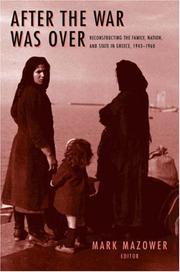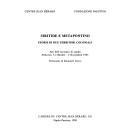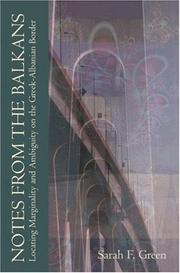| Listing 1 - 6 of 6 |
Sort by
|

ISBN: 1400884438 9781400884438 0691058415 9780691058412 0691058423 9780691058429 Year: 2016 Publisher: Princeton, NJ : Princeton University Press,
Abstract | Keywords | Export | Availability | Bookmark
 Loading...
Loading...Choose an application
- Reference Manager
- EndNote
- RefWorks (Direct export to RefWorks)
This volume makes available some of the most exciting research currently underway into Greek society after Liberation. Together, its essays map a new social history of Greece in the 1940s and 1950s, a period in which the country grappled--bloodily--with foreign occupation and intense civil conflict. Extending innovative historical approaches to Greece, the contributors explore how war and civil war affected the family, the law, and the state. They examine how people led their lives, as communities and individuals, at a time of political polarization in a country on the front line of the Cold War's division of Europe. And they advance the ongoing reassessment of what happened in postwar Europe by including regional and village histories and by examining long-running issues of nationalism and ethnicity. Previously neglected subjects--from children and women in the resistance and in prisons to the state use of pageantry--yield fresh insights. By focusing on episodes such as the problems of Jewish survivors in Salonika, memories of the Bulgarian occupation of northern Greece, and the controversial arrest of a war criminal, these scholars begin to answer persistent questions about war and its repercussions. How do people respond to repression? How deep are ethnic divisions? Which forms of power emerge under a weakened state? When forced to choose, will parents sacrifice family or ideology? How do ordinary people surmount wartime grievances to live together? In addition to the editor, the contributors are Eleni Haidia, Procopis Papastratis, Polymeris Voglis, Mando Dalianis, Tassoula Vervenioti, Riki van Boeschoten, John Sakkas, Lee Sarafis, Stathis N. Kalyvas, Anastasia Karakasidou, Bea Lefkowicz, Xanthippi Kotzageorgi-Zymari, Tassos Hadjianastassiou, and Susanne-Sophia Spiliotis.
Greeks --- Reconstruction (1939-1951) --- Ethnology --- Mediterranean race --- World War, 1939-1945 --- Postwar reconstruction --- Social conditions --- Political aspects --- Reconstruction --- Greece --- History --- History of Greece --- anno 1940-1949 --- anno 1950-1959 --- anno 1960-1969

ISBN: 2903189331 2918887501 9782903189334 Year: 2016 Volume: 13 Publisher: Naples : Publications du Centre Jean Bérard,
Abstract | Keywords | Export | Availability | Bookmark
 Loading...
Loading...Choose an application
- Reference Manager
- EndNote
- RefWorks (Direct export to RefWorks)
Fortification --- Greeks --- Excavations (Archaeology) --- Caulonia (Italy) --- Antiquities. --- Archaeological digs --- Archaeological excavations --- Digs (Archaeology) --- Excavation sites (Archaeology) --- Ruins --- Sites, Excavation (Archaeology) --- Archaeology --- Ethnology --- Mediterranean race --- Fortification, Primitive --- Forts --- Military engineering --- Siege warfare --- Castelvetere (Reggio di Calabria, Italy) --- Italie --- fouille archéologique --- Kaulonia --- Antiquité --- fortifications
Book
ISBN: 9789004297555 9004297553 9004303790 9789004303799 Year: 2016 Publisher: Leiden Brill
Abstract | Keywords | Export | Availability | Bookmark
 Loading...
Loading...Choose an application
- Reference Manager
- EndNote
- RefWorks (Direct export to RefWorks)
"In Greece Reinvented Han Lamers explores the transformations of Byzantine Hellenism in Renaissance Italy. Relinquishing their traditional Roman inheritance, the Byzantine intelligentsia in Italy generally portrayed themselves as 'children of the Hellenes'. On the basis of sources in Greek, Latin, and Italian, and at the crossroads of cultural, literary, and intellectual history, Greece Reinvented shows in what ways Greek exiles such as Bessarion, George Trapezuntius, Ianus Lascaris, Michele Marullo, and others redefined what it meant to be Greek in the Italian diaspora. Placing their renewed 'Greekness' in the context of the cultural exchange between Greeks and Latins, Greece Reinvented reveals the cultural dynamics behind the much-studied transfer of Greek learning from Byzantium to the Latin West"--
Renaissance --- Greeks --- History. --- Migrations --- History --- Byzantine Empire --- Italy --- Intellectual life. --- Intellectual life --- Kulturvermittlung. --- 1268 - 1559. --- 1268-1559. --- Civilization. --- Hellenism. --- Migration. --- Renaissance. --- Byzantine Empire. --- Byzantinisches Reich. --- Italien. --- Italy. --- Ethnology --- Mediterranean race --- Byzantium (Empire) --- Vizantii︠a︡ --- Bajo Imperio --- Bizancjum --- Byzantinē Autokratoria --- Vyzantinon Kratos --- Vyzantinē Autokratoria --- Impero bizantino --- Bizantia --- Revival of letters --- Civilization --- History, Modern --- Civilization, Medieval --- Civilization, Modern --- Humanism --- Middle Ages


ISBN: 2903189579 2918887552 9782903189570 Year: 2016 Volume: 20 Publisher: Naples : Publications du Centre Jean Bérard,
Abstract | Keywords | Export | Availability | Bookmark
 Loading...
Loading...Choose an application
- Reference Manager
- EndNote
- RefWorks (Direct export to RefWorks)
undefined
Greeks --- Excavations (Archaeology) --- Grecs --- Fouilles (Archéologie) --- Colonization --- Congresses --- Colonisation --- Congrès --- Siris (Italy : Extinct city) --- Heraclea (Italy : Extinct city) --- Metapontum (Extinct city) --- Metaponto (Italy) --- Basilicata (Italy) --- Siris (Italie : Ville ancienne) --- Héraclée de Lucanie (Ville ancienne) --- Metapontum (Ville ancienne) --- Metaponto (Italie) --- Basilicate (Italie) --- Congresses. --- Antiquities --- Antiquités --- History --- Italy --- 937.7 --- 325.33809377 --- History Ancient world Italy Southern Italy --- Social sciences Colonization by Ancient world Greece in Ancient world Southern Italy --- Conferences - Meetings --- Fouilles (Archéologie) --- Congrès --- Héraclée de Lucanie (Ville ancienne) --- Antiquités --- Ethnology --- Mediterranean race --- Metaponto Region (Italy) --- Siris (Ancient city) --- Metapontion (Extinct city) --- Metaponto (Extinct city) --- Metapontum (Ancient city) --- Eraclea (Italy : Extinct city) --- Herakleia (Italy : Extinct city) --- Hrakleia (Italy : Extinct city) --- Greeks - Colonization - Italy - Metaponto Region - History - Congresses --- Siris (Italy : Extinct city) - Congresses --- Heraclea (Italy : Extinct city) - Congresses --- Metapontum (Extinct city) - Congresses --- Italy - Antiquities - Congresses --- archeologia --- Siritide --- Metapontino --- scavi --- età del ferro
Book
ISBN: 0520292464 9780520292468 052095954X 9780520959545 0520281276 9780520281271 9780520281271 Year: 2016 Publisher: Berkeley (Calif.) : University of California press,
Abstract | Keywords | Export | Availability | Bookmark
 Loading...
Loading...Choose an application
- Reference Manager
- EndNote
- RefWorks (Direct export to RefWorks)
In the aftermath of Alexander the Great's conquests in the late fourth century B.C., Greek garrisons and settlements were established across Central Asia, through Bactria (modern-day Afghanistan) and into India. Over the next three hundred years, these settlements evolved into multiethnic, multilingual communities as much Greek as they were indigenous. To explore the lives and identities of the inhabitants of the Graeco-Bactrian and Indo-Greek kingdoms, Rachel Mairs marshals a variety of evidence, from archaeology, to coins, to documentary and historical texts. Looking particularly at the great city of Ai Khanoum, the only extensively excavated Hellenistic period urban site in Central Asia, Mairs explores how these ancient people lived, communicated, and understood themselves. Significant and original, The Hellenistic Far East will highlight Bactrian studies as an important part of our understanding of the ancient world.
Antiquities. --- Archäologie. --- Cities and towns, Ancient --- Cities and towns, Ancient. --- Excavations (Archaeology) --- Excavations (Archaeology). --- Greeks --- Greeks. --- Group identity --- Group identity. --- Social archaeology --- Social archaeology. --- History. --- Afghanistan --- Asia --- Asia, Central --- Asia, Central. --- Ay Khānom (Afghanistan) --- Bactria --- Ferner Osten. --- Hellenobaktrisches Reich. --- Indogriechisches Reich. --- HISTORY / Ancient / General. --- Garrisons --- Ethnology --- Mediterranean race --- Geography, Ancient --- Collective identity --- Community identity --- Cultural identity --- Social identity --- Identity (Psychology) --- Social psychology --- Collective memory --- Archaeology --- History --- Methodology --- Ay Khānom (Afghanistan) --- Aï Khanoum (Afghanistan) --- Ai Khanum (Afghanistan) --- Ay Khanum (Afghanistan) --- Baktrii︠a︡-Tokharistan --- Bactriane-Tokharistan --- Bactriana --- Zariaspa --- Battriana --- Central Asia --- Soviet Central Asia --- Tūrān --- Turkestan --- West Turkestan --- Languages --- ai khanoum. --- alexander the great. --- alexandria on the oxus. --- ancient history. --- ancient people. --- ancient world. --- antiquity. --- archaeology. --- bactria. --- central asia. --- coins. --- conquests of alexander the great. --- eucratidia. --- extensively excavated. --- graeco bactrian kingdoms. --- greece. --- greek empire. --- greek garrison. --- hellenistic period. --- india. --- indigenous peoples. --- indo greek kingdoms. --- late fourth century. --- modern day afghanistan. --- multi ethnic. --- multi lingual. --- urban site.

ISBN: 0691121990 0691121982 9780691121987 9780691121994 1400884357 9781400884353 Year: 2016 Volume: *3 Publisher: Princeton Princeton University Press
Abstract | Keywords | Export | Availability | Bookmark
 Loading...
Loading...Choose an application
- Reference Manager
- EndNote
- RefWorks (Direct export to RefWorks)
Maps and borders notwithstanding, some places are best described as "gaps"--places with repeatedly contested boundaries that are wedged in between other places that have clear boundaries. This book explores an iconic example of this in the contemporary Western imagination: the Balkans. Drawing on richly detailed ethnographic research around the Greek-Albanian border, Sarah Green focuses her groundbreaking analysis on the ambiguities of never quite resolving where or what places are. One consequence for some Greek peoples in this border area is a seeming lack of distinction--but in a distinctly "Balkan" way. In gaps (which are never empty), marginality is, in contrast with conventional understandings, not a matter of difference and separation--it is a lack thereof. Notes from the Balkans represents the first ethnographic approach to exploring "the Balkans" as an ideological concept. Green argues that, rather than representing a tension between "West" and "East," the Balkans makes such oppositions ambiguous. This kind of marginality means that such places and peoples can hardly engage with "multiculturalism." Moreover, the region's ambiguity threatens clear, modernist distinctions. The violence so closely associated with the region can therefore be seen as part of continual attempts to resolve the ambiguities by imposing fixed separations. And every time this fails, the region is once again defined as a place that will continually proliferate such dangerous ambiguity, and could spread it somewhere else.
Marginality, Social --- Cultural fusion --- Greeks --- #SBIB:39A72 --- Ethnology --- Mediterranean race --- Culture fusion --- Fusion, Cultural --- Hybridism (Social sciences) --- Hybridity (Social sciences) --- Cultural relations --- Acculturation --- Assimilation (Sociology) --- Ethnicity --- Multiculturalism --- Cultural pluralism --- Exclusion, Social --- Marginal peoples --- Social exclusion --- Social marginality --- Culture conflict --- Social isolation --- Sociology --- People with social disabilities --- History --- Etnografie: Europa --- Pōgōni (Greece : Region) --- Epirus (Greece and Albania) --- Greece --- Albania --- Epir (Greece and Albania) --- Ípiros (Greece and Albania) --- Pōgōnion (Greece : Region) --- Social conditions. --- Ethnic relations. --- Boundaries. --- Pōgōni (Greece : Region) --- Albanie --- People's Socialist Republic of Albania --- People's Republic of Albania --- Shqipëria --- Republika Popullore Socialiste e Shqipërisë --- Republika Popullore e Shqipërisë --- Albanien --- Albanija --- Albaniya --- Alvania --- Arnautluk --- Sheypeni --- Shkipeni --- Shqipenia --- Shqipëri --- Shqipni --- Shqipnia --- Shqipnië --- Shqipnija --- Shqipri --- Shqipria --- Shqiprija --- Shqypëni --- Shqypni --- PSR of Albania --- Republika e Shqipërisë --- Republic of Albania --- RPS të Shqipërisë --- RSH --- Arnavutluk --- Albaani --- Albaania --- Albaanje --- Albàinia --- Albani --- Albanio --- Albanska --- Albánsko --- Albanujo --- Albanya --- An Albáin --- An-ba-ni --- Arnavutluk Cumhuriyeti --- Elbanya --- Lalbanän --- República d'Albània --- Shkiperiya --- République populaire socialiste d'Albanie --- ألبانيا --- Arbinishia --- Republica Arbinishia --- Avaña --- Albaniya Respublikası --- Албанія --- Albanii︠a︡ --- Республіка Албанія --- Respublika Albanii︠a︡ --- Republikan kan Albanya --- Албания --- Република Албания --- Republika Albanii︠a︡ --- Албани --- Republika sa Albanya --- Albánská republika --- Gweriniaeth Albania --- Republikken Albanien --- Republik Albanien --- Dziłigaii Bikéyah --- Republika Albańska --- Albaania Vabariik --- Αλβανία --- Δημοκρατία της Αλβανίας --- Dēmokratia tēs Alvanias --- Repóbblica d'l Albanî --- República de Albania --- Respubliko Albanio --- Repúbrica d'Albánia --- Albaniako Errepublika --- République d'Albanie --- Lýðveldið Albania --- Lýðveldið Albaniu --- Poblacht na hAlbáine --- Yn Albaan --- Pobblaght ny h-Albaan --- Â-ngì-pâ-nì-â --- Арнгудин Орн --- Arngudin Orn --- 알바니아 --- ʻAlepania --- Republika Albanija --- Repubblica di Albania --- אלבניה --- Albanyah --- רפובליקת אלבניה --- Republiḳat Albanyah --- Griechenland --- Grèce --- Hellas --- Yaṿan --- Vasileion tēs Hellados --- Hellēnikē Dēmokratia --- République hellénique --- Royaume de Grèce --- Kingdom of Greece --- Hellenic Republic --- Ancient Greece --- Ελλάδα --- Ellada --- Ελλάς --- Ellas --- Ελληνική Δημοκρατία --- Ellēnikē Dēmokratia --- Elliniki Dimokratia --- Grecia --- Grčija --- Hellada --- アルバニア --- Arubania --- Qeverija Demokratike e Shqipërisë --- اليونان --- يونان --- al-Yūnān --- Yūnān --- 希腊 --- Xila --- Греция --- Gret︠s︡ii︠a︡ --- Marginality [Social ] --- Pogoni Region (Greece) --- 20th century --- Social conditions --- Ethnic relations --- Boundaries --- Cultural hybridity --- Transculturalism --- Transculturation
| Listing 1 - 6 of 6 |
Sort by
|

 Search
Search Feedback
Feedback About
About Help
Help News
News